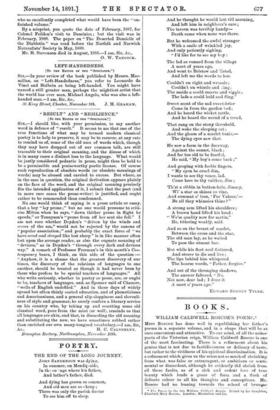" RESULT " AND " RESILIENCE."
[TO THE EDITOR OF THE " SPECTATOR:1
Sin,—I should like, with your permission, to say another word in defence of " result." It seems to me that one of the true functions of what may be termed modern classical poetry is to help to preserve, it may be to recover, at any rate to remind us of, some of the old uses of words which, though they may have dropped out of our common talk, are still traceable to their original meaning, and the disuse of which is in many cases a distinct loss to the language. What would be justly considered pedantic in prose, might thus be held to be a permissible and praiseworthy poetic license. Of course such reproduction of obsolete words (or obsolete meanings of words) may be abused and carried to excess. But where, as in the case in question, the original derivation appears plainly on the face of the word, and the original meaning precisely fits the intended application of it, I submit that the poet (and in more rare cases the prose-writer) is justified, and ought rather to be commended than condemned.
No one would think of saying in a prose article or essay, that a boy " lay prone ;" but no one would presume to criti- cise Milton when he says, " down thither prone in flight he speeds," or Tennyson's "prone from off her seat she fell." I am not sure whether Dryden's " driven by the winds and errors of the sea," would not be rejected by the canons of " popular association ;" and probably the exact force of " we have erred and strayed like lost sheep" is in like manner often lost upon the average reader, as also the cognate meaning of "devious," as in Dryden's "through every dark and devious way." A remark of Professor Freeman's in this month's Con- temporary bears, I think, on this side of the question :— " Anyhow, it is a shame that the greatest discovery of our times, the discovery of the relations of languages to one another, should be treated as though it had never been by those who profess to be special teachers of languages." All who write seriously, whether in poetry or prose, are, or ought to be, teachers of languages, and, as Spenser said of Chaucer, "wells of English undefiled." And in these days of widely spread but often thinly coated education, and of phoneticisms and Americanisms, and a general slip-sloppiness and slovenli- ness of style and grammar, he surely confers a literary service -on his country who, by taking up and resetting some old classical word, pure from the mint (or well), reminds us that all languages are akin, and that, in discarding the old meaning and substituting the new, we have sometimes robbed rather than enriched our own many-tongued vocabulary.—I am, Sir,






































 Previous page
Previous page